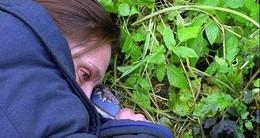Dir: Bakur Bakuradze. Russia. 2011. 124mins

Hyper-naturalistic (fielding an entire cast of non-professionals), agricultural, and glacial in pace, Bakur Bakuradze’s second film The Hunter (Okhotnik) is unafraid to make demands of its audience over a two-hour-plus running time. Set on a pig-farm in Pskov in Russia’s Northwest, it is dramatically uneventful yet occasionally watchable - if the viewer buys into its policy of strict information-rationing.
The Hunteris clearly limited by budget concerns, but some strong sound work and smart editing make it feel like a smooth enough ride.
Following up Shultes, which also received an Un Certain Regard berth at Cannes, Bakuradze has become even more elusive in his plotting. This deliberate setting aside of narrative combined with a sparseness in production (there is no score, for example, and hardly any dialogue) and lengthy running time will see The Hunter confined to the more rarified end of the festival circuit, where it may draw a following. Theatrical exposure at home would appear to be a challenge.
The Hunter tracks day-to-day life on a remote pig farm where Ivan (Barskovich) lives with his wife, young son Kolya (Avdochenok) and teenage daughter. He runs the business watchfully with the help of manager Viktor (Degilev), who is the closest he has to a friend.
His son has only one arm and occasionally visits the doctor, or a health spa, for treatment, and is keen to become a boar hunter like his father. Kolya frets that he will not be able to hold the rifle and Ivan becomes increasingly concerned with this potential problem.
To the ambient sounds of grinding farm machinery and squealing pigs, an exhausted sow gives birth and is rapidly sent for impregnation again. The local mill is forced to close due to a temporary shortage of flax, and Ivan hires two women from the plant to muck out his pig pens.
It slowly becomes apparent that they are part of a local prison labour camp. One cannot stomach life on a livestock farm; the second, Lyuba, appears more engaged in the routine, and we note that Ivan is watching her.
Bakuradze’s camera studies the daily grind of life on this farm, largely carried out in silence. Ivan, Kolya and Viktor visit a sausage factory and invest in similar machinery for their own farm. They take their pig carcasses in the back of a van to local abattoirs (vegetarians may not warm to this film).
They go out on the lake in a boat, trying to see a WWII fighter plane that was shot down by Nazis and now lies below the waters. They notice the tracks of some poachers. Kolya develops a fondness for the raccoons Viktor is breeding for a winter hat. Life follows a set routine.
Bakuradze’s use of non-actors works in this setting, and Ivan in particular is a natural, his performance complemented by Lyuba’s angular, silent face.
The director clearly believes that the audience will be drawn into their silent world, to become part of the gaps between them; but The Hunter’s running time is leisurely for a film this dramatically sparse. Technically, The Hunteris clearly limited by budget concerns, but some strong sound work and smart editing make it feel like a smooth enough ride.
Production companies: CTB Film Company, Salvador D, Intercinema
International sales: Intercinema Agency, raisafomina@mail.ru
Producer: Sergey Selyanov
Executive producer: Julia Mishkinene
Screenplay: Bakur Bakuradze, Ilya Malakhova
Cinematography: Nikolay Vavilov
Production designer: Kirill Shuvalov
Editors: Daria Gladysheva, Ilya Malakhova, Arseniy Troitskiy
Main cast: Mikhail Barskovich, Tatiana Shapovalova, Gera Avdochenok, Vladimir Degilev






![The Brightest SunScreen[Courtesy HKIFF]](https://d1nslcd7m2225b.cloudfront.net/Pictures/274x183/3/5/0/1448350_thebrightestsunscreencourtesyhkiff_312678.jpg)














